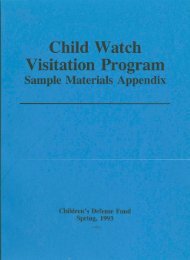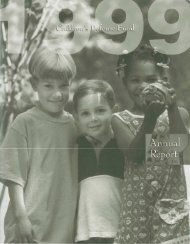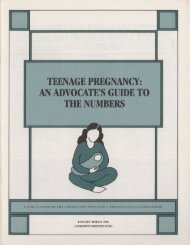children out of school in america - University of Tennessee Digital ...
children out of school in america - University of Tennessee Digital ...
children out of school in america - University of Tennessee Digital ...
You also want an ePaper? Increase the reach of your titles
YUMPU automatically turns print PDFs into web optimized ePapers that Google loves.
th<strong>in</strong>k there is enough counsel<strong>in</strong>g, especially vocational<br />
counsel<strong>in</strong>g. There has never been a Spanishspeak<strong>in</strong>g<br />
student accepted <strong>in</strong>to New Bedford Vocational<br />
High SchooI."81 Others <strong>in</strong> New Bedford reported<br />
to us that it is very difficult to ga<strong>in</strong> admittance<br />
to the vocational <strong>school</strong>, especially for students from<br />
non-English-speak<strong>in</strong>g backgrounds. 82<br />
The absence <strong>of</strong> counsel<strong>in</strong>g and other supportive<br />
services was a problem <strong>in</strong> most <strong>of</strong> the districts we<br />
visited. This is exacerbated by the lack <strong>of</strong> personnel<br />
who speak a language other than English. A<br />
Catholic nun who works with non-English-speak<strong>in</strong>g<br />
<strong>children</strong> <strong>in</strong> Spr<strong>in</strong>gfield said that Spanish <strong>children</strong> <strong>in</strong><br />
the area "really need some counsel<strong>in</strong>g <strong>in</strong> Spanish."<br />
She added that because they are usually admitted to<br />
special classes only if they speak some English,<br />
Spanish-speak<strong>in</strong>g handicapped or mentally retarded<br />
<strong>children</strong> especially suffer. They are generally kept<br />
<strong>in</strong> regular classes and just keep fall<strong>in</strong>g further and<br />
further beh<strong>in</strong>d because there is so little help.8s For<br />
example, the Learn<strong>in</strong>g Disabilities Center <strong>in</strong> Spr<strong>in</strong>gfield<br />
serves few Spanish-speak<strong>in</strong>g <strong>children</strong> because<br />
it lacks the techniques "to work with them." Consequently,<br />
referrals <strong>of</strong> these <strong>children</strong> are discouraged.<br />
S<strong>in</strong>ce the Pupil Adjustment Center has no<br />
facilities for counsel<strong>in</strong>g <strong>in</strong> Spanish, Spanish-speak<strong>in</strong>g<br />
<strong>children</strong> with emotional problems cannot benefit<br />
from the Center's services unless they speak some<br />
English. 84<br />
In Spr<strong>in</strong>gfield, where ESEA Title I funds an entire<br />
Social and Psychological Services Unit with 20 counselors,<br />
none <strong>of</strong> them speaks Spanish. 85 At the time<br />
<strong>of</strong> our visit, there were no bil<strong>in</strong>gual counselors <strong>in</strong><br />
Somerville, but "hopefully the <strong>school</strong> department<br />
will hire one."86<br />
Of the 260 guidance counselors <strong>in</strong> 1973-74 <strong>in</strong> the<br />
District <strong>of</strong> Columbia, none are Spanish-speak<strong>in</strong>g. 87<br />
84 Interview with Kather<strong>in</strong>e Gott, Supervisor and Edward<br />
Burgess, School Psychologist, Learn<strong>in</strong>g Disabilities Center,<br />
Homer Street School, Spr<strong>in</strong>gfield, Massachusetts, 12/10/73.<br />
85 Interview with Dr. William Brady, Director, Social and<br />
Psychological Services Unit, Spr<strong>in</strong>gfield, Massachusetts,<br />
12/7/73.<br />
86 Interview with Dr. loseph Walsh, Pr<strong>in</strong>cipal, S<strong>out</strong>hern Ir.<br />
High, Somerville, Massachusetts, 1115/73.<br />
87 Interview with Nathaniel Hill, Supervisory Director <strong>of</strong><br />
Guidance and Counsell<strong>in</strong>g, Wash<strong>in</strong>gton, D.C., 5/13/74.<br />
88 Interview with George Counter, Supervisor <strong>of</strong> Elementary<br />
Education, Holyoke, Massachusetts, 12/12/73.<br />
In Holyoke, "a Spanish-speak<strong>in</strong>g kid may have<br />
severe emotional problems or may be mentally retarded,<br />
but we can't place him <strong>in</strong> a special program<br />
because we don't have a test which could confirm<br />
our suspicions.... We not only don't have the<br />
tests, we don't have a person to <strong>in</strong>terpret the tests,<br />
no Spanish-speak<strong>in</strong>g psychologist. So kids get put<br />
6n a shortened day or get suspended. At the junior<br />
high level they really get <strong>in</strong> trouble. The bil<strong>in</strong>gual<br />
people tell us to put kids with special problems <strong>in</strong><br />
special education; the special education people say<br />
that bil<strong>in</strong>gual education will take care <strong>of</strong> them. So<br />
kids are fall<strong>in</strong>g between 766 [the Special Education<br />
Law], and Bil<strong>in</strong>gual Education, and we know they<br />
are there. "88<br />
New Bedford has one special education class for<br />
bil<strong>in</strong>gual <strong>children</strong>: an ESL class for eight Portuguese<br />
13 to 16 year olds. For the past three years there<br />
has been a need for three special education classes<br />
for <strong>children</strong> <strong>of</strong> limited English-speak<strong>in</strong>g ability.<br />
"Obviously, we need a class for 1Q-13 year olds,"<br />
even though it is difficult to determ<strong>in</strong>e genu<strong>in</strong>e re-<br />
75














